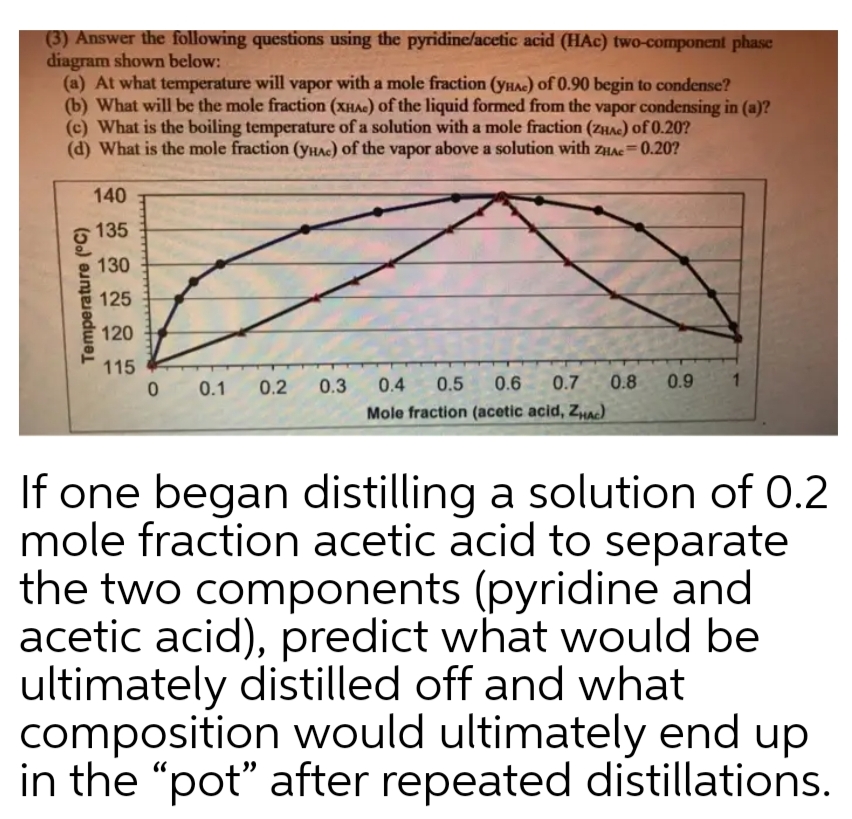(3) Answer the following questions using the pyridine/acetic acid (HAc) two-component phase diagram shown below: (a) At what temperature will vapor with a mole fraction (YHAC) of 0.90 begin to condense? (b) What will be the mole fraction (xHAe) of the liquid formed from the vapor condensing in (a)? (c) What is the boiling temperature of a solution with a mole fraction (ZHAC) of 0.20? (d) What is the mole fraction (yHac) of the vapor above a solution with ZHAC=0.20? %3D
(3) Answer the following questions using the pyridine/acetic acid (HAc) two-component phase diagram shown below: (a) At what temperature will vapor with a mole fraction (YHAC) of 0.90 begin to condense? (b) What will be the mole fraction (xHAe) of the liquid formed from the vapor condensing in (a)? (c) What is the boiling temperature of a solution with a mole fraction (ZHAC) of 0.20? (d) What is the mole fraction (yHac) of the vapor above a solution with ZHAC=0.20? %3D
Introduction to Chemical Engineering Thermodynamics
8th Edition
ISBN:9781259696527
Author:J.M. Smith Termodinamica en ingenieria quimica, Hendrick C Van Ness, Michael Abbott, Mark Swihart
Publisher:J.M. Smith Termodinamica en ingenieria quimica, Hendrick C Van Ness, Michael Abbott, Mark Swihart
Chapter1: Introduction
Section: Chapter Questions
Problem 1.1P
Related questions
Question
100%

Transcribed Image Text:(3) Answer the following questions using the pyridine/acetic acid (HAC) two-component phase
diagram shown below:
(a) At what temperature will vapor with a mole fraction (YHAC) of 0.90 begin to condense?
(b) What will be the mole fraction (xHAc) of the liquid formed from the vapor condensing in (a)?
(c) What is the boiling temperature of a solution with a mole fraction (ZHAC) of 0.20?
(d) What is the mole fraction (yHac) of the vapor above a solution with zHAe=0.20?
140
135
130
125
120
115
0.1
0.2
0.3
0.4
0.5
0.6
0.7
0.8
0.9
1.
Mole fraction (acetic acid, ZHAe)
If one began distilling a solution of 0.2
mole fraction acetic acid to separate
the two components (pyridine and
acetic acid), predict what would be
ultimately distilled off and what
composition would ultimately end up
in the "pot" after repeated distillations.
Temperature (°C)
Expert Solution
This question has been solved!
Explore an expertly crafted, step-by-step solution for a thorough understanding of key concepts.
This is a popular solution!
Trending now
This is a popular solution!
Step by step
Solved in 3 steps with 4 images

Knowledge Booster
Learn more about
Need a deep-dive on the concept behind this application? Look no further. Learn more about this topic, chemical-engineering and related others by exploring similar questions and additional content below.Recommended textbooks for you

Introduction to Chemical Engineering Thermodynami…
Chemical Engineering
ISBN:
9781259696527
Author:
J.M. Smith Termodinamica en ingenieria quimica, Hendrick C Van Ness, Michael Abbott, Mark Swihart
Publisher:
McGraw-Hill Education

Elementary Principles of Chemical Processes, Bind…
Chemical Engineering
ISBN:
9781118431221
Author:
Richard M. Felder, Ronald W. Rousseau, Lisa G. Bullard
Publisher:
WILEY

Elements of Chemical Reaction Engineering (5th Ed…
Chemical Engineering
ISBN:
9780133887518
Author:
H. Scott Fogler
Publisher:
Prentice Hall

Introduction to Chemical Engineering Thermodynami…
Chemical Engineering
ISBN:
9781259696527
Author:
J.M. Smith Termodinamica en ingenieria quimica, Hendrick C Van Ness, Michael Abbott, Mark Swihart
Publisher:
McGraw-Hill Education

Elementary Principles of Chemical Processes, Bind…
Chemical Engineering
ISBN:
9781118431221
Author:
Richard M. Felder, Ronald W. Rousseau, Lisa G. Bullard
Publisher:
WILEY

Elements of Chemical Reaction Engineering (5th Ed…
Chemical Engineering
ISBN:
9780133887518
Author:
H. Scott Fogler
Publisher:
Prentice Hall


Industrial Plastics: Theory and Applications
Chemical Engineering
ISBN:
9781285061238
Author:
Lokensgard, Erik
Publisher:
Delmar Cengage Learning

Unit Operations of Chemical Engineering
Chemical Engineering
ISBN:
9780072848236
Author:
Warren McCabe, Julian C. Smith, Peter Harriott
Publisher:
McGraw-Hill Companies, The